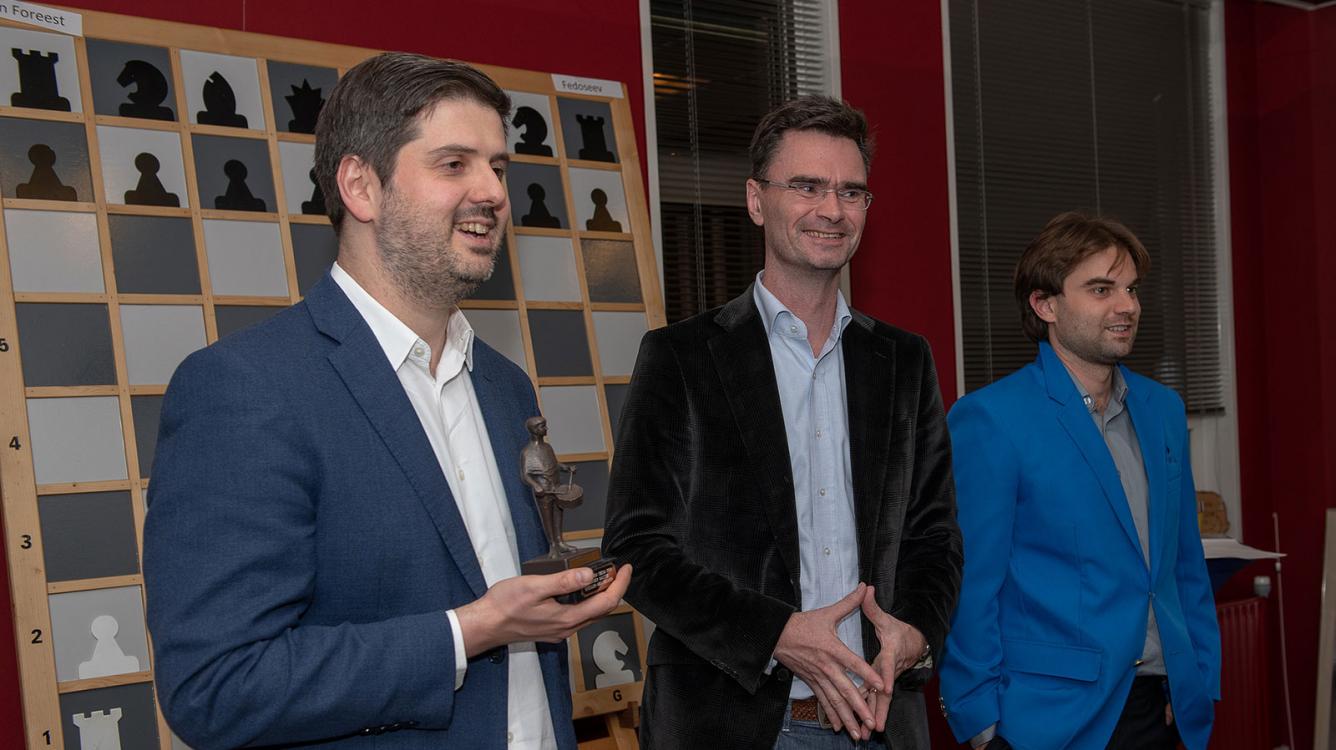
Svidler Beats Shankland In Hoogeveen Match
Despite starting with a loss, Peter Svidler defeated Sam Shankland in a six-game match held in Hoogeveen, the Netherlands.
In the same playing hall, Vladimir Fedoseev and Jorden van Foreest drew all their classical games.
A long tradition of chess in October in Hoogeveen is still kept up. The tournament held in the town in the northeast of the Netherlands is sometimes confused with "Hoogovens," even though that sponsor name for Wijk aan Zee hasn't been used since the year 1999!
The two events used to have the same tournament director (Jeroen van den Berg), but a few years ago Loek van Wely took over in Hoogeveen. The 46-year-old Dutch GM still plays chess (e.g. at the Batumi Olympiad), and is an organizer once a year.
The main event included just four players, who played in a small but stylish hall—part of the Hoogeveen town hall—which is often used for weddings when there is no chess. It has been like this since the first edition in 1997, when the players still played with glass pieces and the then World Junior Champion Emil Sutovsky won the round robin ahead of Judit Polgar, Vassily Smyslov(!) and Van Wely.

The Hoogeveen town hall. | Photo: Hoogeveen Chess.
For the third year now, instead of a "crown group" there were two six-game matches, with Svidler vs Shankland as the headliner. The St. Petersburg grandmaster was perhaps only a slight favorite, considering his disappointing score at the European Club Cup and Shankland's excellent year 2018 so far.
On that note, a prediction of 3.5-2.5 for Svidler would have made sense, although it's easy to say in hindsight. The match winner hadn't shaken off his bad form from Porto Carras just yet, and went down in the first game.
Svidler spent some time before trying a recipe of his good friend Alexander Grischuk that involves an early pawn sacrifice, and developed his bishop to c5 despite having played ...g6 earlier. Shankland remained a pawn up and eventually converted in a double rook endgame.

Sam Shankland started well, but wouldn't win another game. | Photo: Hoogeveen Chess.
Svidler levelled the score right away in the next game that had some similarities: again he sacrificed a pawn, and again Black went ...g6 but then also ...Bc5. The main factor, however, was Black's king not finding a save haven.

Peter Svidler won two of his white games. | Photo: Hoogeveen Chess.
After a draw in game three, Svidler also won his next white game—the last decisive game in the match, as it turned out, and arguably the best.
The players of the other match, former Dutch champion Van Foreest (Jorden that is, the oldest of a large chess family) and Fedoseev (like Svidler from St. Petersburg) are not exactly known for their quiet playing styles, but somehow all of their six games ended in draws. (The Russian player eventually won a blitz playoff.)

Van Foreest and Fedoseev starting one of their games. | Photo: Hoogeveen Chess.
It was definitely a fighting match: the shortest of those six games lasted 48 moves, and in two they played until bare kings. Here's game four:
The open tournament was won by Bassem Amin. The Egyptian grandmaster was the strongest in a playoff that was played after round seven among the top four players by that point, while the rest of the players played their regular rounds eight and nine. It was an interesting format that more open tournaments might want to consider.
Amin had a lovely way to finish his tournament:

Bassem Amin, the winner of the Open event. | Photo: Hoogeveen Chess.
Games via TWIC.


